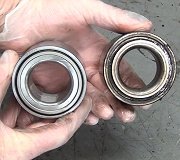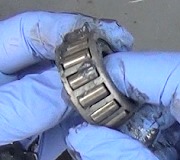Thanks James for your help on this braking problem. I took your advice and began to focus my attention on the rear brakes, starting @ the rear wheels. Took the drums off and checked for leakage @ the wheel cylinders, polished drums and shoes, bent/ kinked lines, etc. There was dust in the drums as evidence of rear brake usage, but very little shoe wear for having more than 10K miles. All checked out otherwise, so I next focused on the RABS actuator on the frame. Since I had no way to trouble shoot it, I replaced it w/ a new unit and re-bled the entire system again (saturday 12/21). Road tested the truck and found that the front left caliper was still dragging, but the right side was intact. On Sunday, I replaced the left caliper again, re-bled the front, drove the truck for several miles and then once again checked the front- No more dragging caliper!
Here is my final summation: As you suspected, the front brakes were working fine at one time, the rears not receiving the full alloted pressure due to contamination in the RABS actuator, which @ some point, the front brakes were doing more of the work than necessary to compensate for the lack of pressure to the rears. This extra work on the front brakes caused the overheating problem, first to the pistons of the calipers, (which to my surprise were pnelolic and not metal). I believe the calipers, once overheating, started dragging on the rotors while the truck was in motion, causing the rapid wear on the pads and rotors. I believe the left side overheated always faster than the right, because of the short distance of line between the left wheel and the master cylinder.
In any respect, a very, very expensive and frustrating lesson to learn! Thank you so very much and have a wonderful Christmas! I hope that my situation can be useful to your cause! THANKS
Tuesday, December 23rd, 2008 AT 9:38 PM


